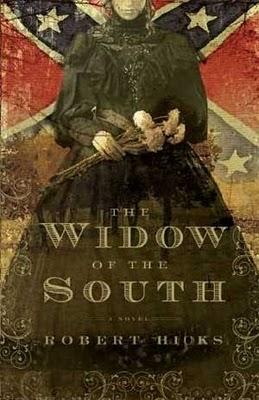The Widow of the South

Though it’s based in reality, Robert Hicks’ work of historical fiction The Widow of the South is an incredibly long, often meandering novel that failed to rouse me in any real way. And that’s something I’m truly sorry to report.
A few years ago, I became interested in all things Southern. My boyfriend, born and raised in Alabama, is like this treasure trove of lovely, unfamiliar things, and the area in which he was raised never fails to fascinate me, a girl who was born and raised in Los Angeles. The American South is this incredibly multi-faceted, bizarre, segmented country of its own, and I think its bloody, checkered past is greatly responsible for both its beauty and savagery. Needless to say, I was very excited to read Hicks' Deep South tale of a woman named Carrie McGavock, who had 1,500 Confederate soldiers buried in her back yard.
The opening scene of the novel takes place in 1894 and is perhaps the most telling of McGavock and what she has become; she spends her days almost obsessively walking the aisles of her personal cemetery with her former slave, wearing the same black dress she’s worn out of mourning for countless years, checking to make sure everyone is buried where they’re supposed to be. After McGavock’s home, the Carnton Plantation, was taken over by Confederate soldiers nearly thirty years prior, it’s safe to say that she was never the same again.
I’d be very interested in a novel that took the pains to describe exactly what kind of woman it would take to muster the strength and heart to dig up the bodies of these soldiers--whose original graves were going to be plowed over--and rebury them in her own backyard. There is a real sense of dignity and respect in this well-researched story, so I was disappointed—but not surprised—when a love story emerged that detailed the relationship between McGavock and a soldier named Zachariah Cashwell during the bloodiest hours of the war.
Frankly, I hate how novels, movies, and television shows of all kinds feel this overwhelming, almost obsessive need to throw a love story into any story featuring an interesting, strong, or otherwise compelling female character. Sure, love happens and the fact that McGavock and Cashwell were able to fall in love during the madness that was the Civil War is compelling in its own way, but in The Widow of the South it almost seems to cheapen McGavock’s strong character. The entire novel features lengthy passages of beautifully written prose, but sometimes it’d simply be nice to see a woman’s story stand on its own... and perhaps for a little less than 551 pages.
Thanks for this honest and entertaining review. I am a native Southerner who agrees with your perspective on its multifaceted history and savage beauty. I also agree with your statement that tossing a love story in the midst of what could have been a more interesting story without it isn't the best marketing decision. ;)
Thanks! - Fellow reviewer M. Brianna Stallings